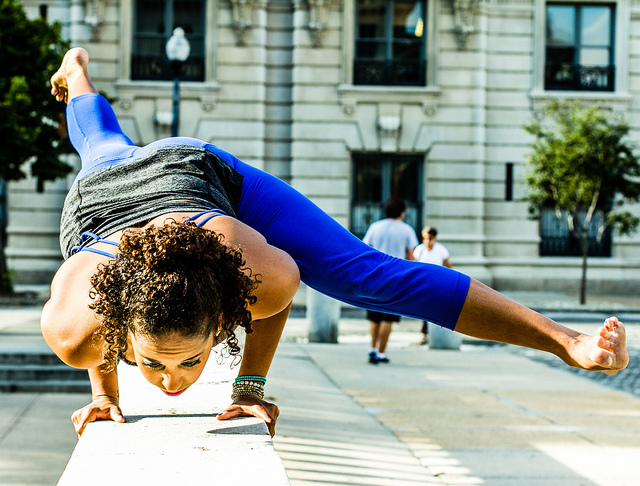Scene: I’m about halfway through my usual Monday morning level 1/2 vinyasa flow class.
Most of the faces in the room are familiar—people who come regularly each week. One always makes a particularly strong impression: a Russian woman who, no matter what the rest of the class is doing, insists on doing something completely different.
When we’re in crow pose, she’s in prayer twist. When we’re in down dog, she’s working on eagle. When we’re in pigeon, she’s in savasana and when we’re in savasana she jumps into pigeon.
Her behavior goes far beyond simply modifying poses for herself, or taking an occasional foray into her own yogic world—she is completely and utterly disconnected from what is happening in the rest of the class.
I have never had a single complaint about this student, who is very pleasant and friendly despite being so fiercely independent, but I have to wonder—is her behavior acceptable?
I posed the question to my Facebook friends, who had many and varied responses:
“I feel that yoga is a person centred practice & what harm is in someone honouring their own sequence? As long as they are on their mat, then is that not their choice?”
“Erica who are you for your students? If you are being who you intend to be for them does it matter what anyone does or does not do? Make your class a safe space for your students and ensure that it remains safe. If she isn’t a danger to others physically does it need to be addressed? Can you be love for everyone regardless of what they are up to?”
“Let her do what she wants and when she adds in chanting just go with it? Come on…when the student is ready the teacher appears—yes the ultimate teacher is inside and when a person has truly reached a level of personal expertise they discover the art of humility and what is gained from that when accepting another as a teacher even for a short space of time. Watch the truly experienced experts who go and take a beginner’s class to open another level of self-awareness. They do what is being done and seek deeper levels of awareness in the simple moment.”
“My opinion is different, too. In our training, we surrender to going within, so most of us are unaware of what others around us are doing. I think it’s cool that she keeps showing up…she obviously enjoys you as a teacher, even if she is a ‘rule breaker.'”
“Call me simple, but seriously… It’s a yoga class. YOU are the teacher of said yoga class. Not only is she a distraction to others, but she’s making it difficult for you to teach your class. It’s NOT a question of “love”, but a demonstration of ego… Hers! You have every right to address the issue. If she wants to do her own thing, she can do so elsewhere.”
Overall, people fell pretty evenly into two camps.
Camp one: As a teacher I should relax and go with the flow.
Camp two: I should help this woman learn how to play well with others because she is distracting and disrespectful.
In general, I think situations like these need to be considered on a case by case basis. In other words, there is not a one-size-fits-all way to handle the rogue yoga student. But when things become as extreme as this, I do think something needs to be said.
But what? And to whom? To the student herself? To the class in general? To the rest of the students in private? (All three things suggested by different people responding to this post.)
To date, I have remained mute—a decision that some said lessened my “authority” as a teacher, and perhaps it has. My instinct was that I should be able to lead the rest of my students regardless of this (increasingly—to me anyway) frustrating distraction, and as annoying as I may find it, there was no ill will on the part of this student so I should be tolerant.
But if she comes to my next Monday morning class (and she probably will), I’m going to have some decisions to make.
Am I best serving all of my students by allowing this to continue? It’s not like this woman is coming in and screaming profanities or something, she’s just doing a (dramatically) different sequence.
On the other hand, if I am a student, paying for a class, spending my precious time and energy in being there, I would like to think the space is protected—and I, the teacher, am the only one in a position to protect it. It’s draining for me and the rest of the class (I assume) to have to wonder what this woman is up to up to, or to forcibly ignore her, or to have to write a whole article about her.
On the other other hand, as several people rightly said, she is my teacher. What can I learn from her? About tolerance, about sacred spaces, about leadership?
Am I over-thinking this? Most likely. But pondering these questions is part of my job.
I’m not sure yet what I will decide when my Russian regular next roles out her anarchistic mat, but I can tell you this: whatever I do or don’t do will be done with love, compassion and kindness.
Love elephant and want to go steady?
Sign up for our (curated) daily and weekly newsletters!
Editor: Emily Bartran
Photo: Dave Rosenblum/Flickr

 Share on bsky
Share on bsky







Read 26 comments and reply